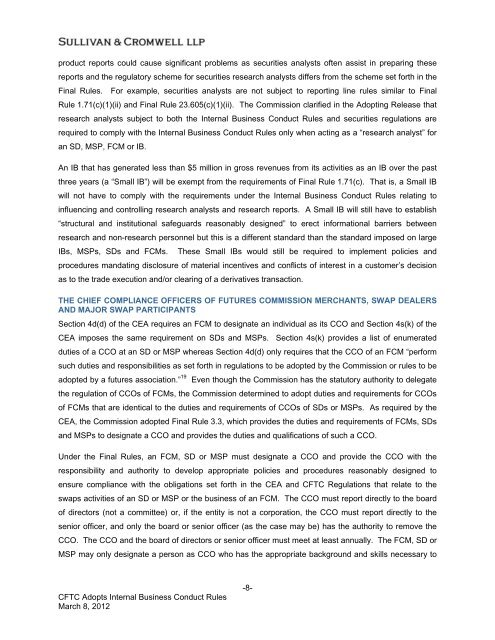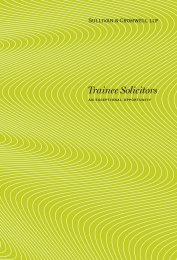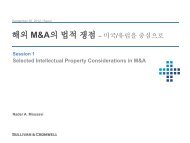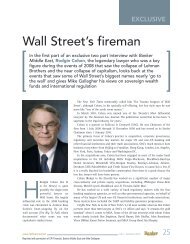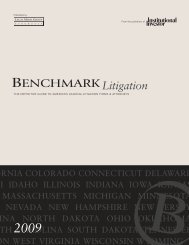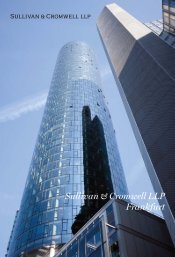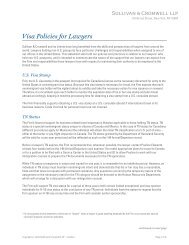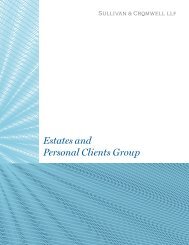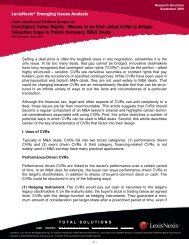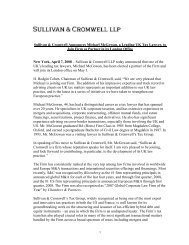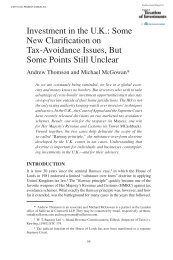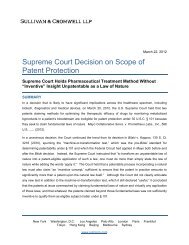CFTC Adopts Internal Business Conduct Rules - Sullivan & Cromwell
CFTC Adopts Internal Business Conduct Rules - Sullivan & Cromwell
CFTC Adopts Internal Business Conduct Rules - Sullivan & Cromwell
Create successful ePaper yourself
Turn your PDF publications into a flip-book with our unique Google optimized e-Paper software.
product reports could cause significant problems as securities analysts often assist in preparing these<br />
reports and the regulatory scheme for securities research analysts differs from the scheme set forth in the<br />
Final <strong>Rules</strong>. For example, securities analysts are not subject to reporting line rules similar to Final<br />
Rule 1.71(c)(1)(ii) and Final Rule 23.605(c)(1)(ii). The Commission clarified in the Adopting Release that<br />
research analysts subject to both the <strong>Internal</strong> <strong>Business</strong> <strong>Conduct</strong> <strong>Rules</strong> and securities regulations are<br />
required to comply with the <strong>Internal</strong> <strong>Business</strong> <strong>Conduct</strong> <strong>Rules</strong> only when acting as a “research analyst” for<br />
an SD, MSP, FCM or IB.<br />
An IB that has generated less than $5 million in gross revenues from its activities as an IB over the past<br />
three years (a “Small IB”) will be exempt from the requirements of Final Rule 1.71(c). That is, a Small IB<br />
will not have to comply with the requirements under the <strong>Internal</strong> <strong>Business</strong> <strong>Conduct</strong> <strong>Rules</strong> relating to<br />
influencing and controlling research analysts and research reports. A Small IB will still have to establish<br />
“structural and institutional safeguards reasonably designed” to erect informational barriers between<br />
research and non-research personnel but this is a different standard than the standard imposed on large<br />
IBs, MSPs, SDs and FCMs. These Small IBs would still be required to implement policies and<br />
procedures mandating disclosure of material incentives and conflicts of interest in a customer’s decision<br />
as to the trade execution and/or clearing of a derivatives transaction.<br />
THE CHIEF COMPLIANCE OFFICERS OF FUTURES COMMISSION MERCHANTS, SWAP DEALERS<br />
AND MAJOR SWAP PARTICIPANTS<br />
Section 4d(d) of the CEA requires an FCM to designate an individual as its CCO and Section 4s(k) of the<br />
CEA imposes the same requirement on SDs and MSPs. Section 4s(k) provides a list of enumerated<br />
duties of a CCO at an SD or MSP whereas Section 4d(d) only requires that the CCO of an FCM “perform<br />
such duties and responsibilities as set forth in regulations to be adopted by the Commission or rules to be<br />
adopted by a futures association.” 19 Even though the Commission has the statutory authority to delegate<br />
the regulation of CCOs of FCMs, the Commission determined to adopt duties and requirements for CCOs<br />
of FCMs that are identical to the duties and requirements of CCOs of SDs or MSPs. As required by the<br />
CEA, the Commission adopted Final Rule 3.3, which provides the duties and requirements of FCMs, SDs<br />
and MSPs to designate a CCO and provides the duties and qualifications of such a CCO.<br />
Under the Final <strong>Rules</strong>, an FCM, SD or MSP must designate a CCO and provide the CCO with the<br />
responsibility and authority to develop appropriate policies and procedures reasonably designed to<br />
ensure compliance with the obligations set forth in the CEA and <strong>CFTC</strong> Regulations that relate to the<br />
swaps activities of an SD or MSP or the business of an FCM. The CCO must report directly to the board<br />
of directors (not a committee) or, if the entity is not a corporation, the CCO must report directly to the<br />
senior officer, and only the board or senior officer (as the case may be) has the authority to remove the<br />
CCO. The CCO and the board of directors or senior officer must meet at least annually. The FCM, SD or<br />
MSP may only designate a person as CCO who has the appropriate background and skills necessary to<br />
<strong>CFTC</strong> <strong>Adopts</strong> <strong>Internal</strong> <strong>Business</strong> <strong>Conduct</strong> <strong>Rules</strong><br />
March 8, 2012<br />
-8-


